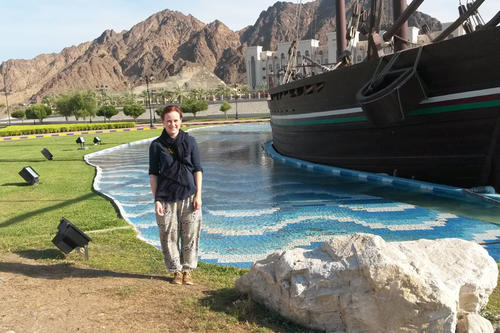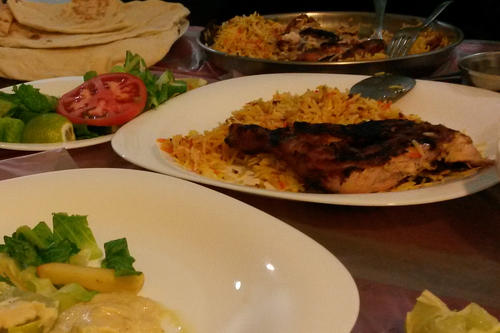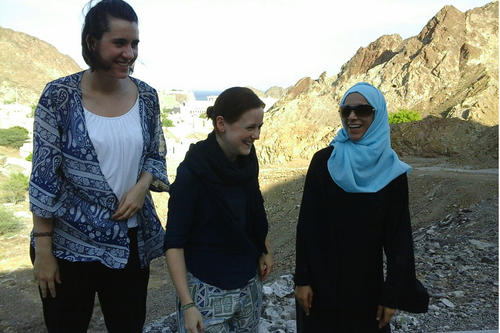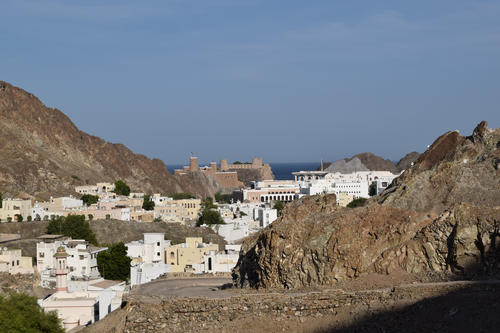Dining in Muscat
Letter from Oman! Salome Bader tried shuwa, a traditional dish.
Oct 12, 2015
A lot of things are different from what she expected, and most of all, different from at home. Salome Bader is enchanted after just a few days – by the friendly people in Oman and the impressive landscape.
Chicken with rice and salad, potatoes and hummus – and, of course, bread. This photo shows typical Omani foods. During the traditional family meal where Salome tasted shuwa, she refrained from taking photographs in deference to her hosts.
Image Credit: Privat
Miss Thuraya (right) guided Salome (center) and her roommate, Anne, who is also studying at Freie Universität, through Muscat.
Image Credit: Privat
The view of Old Muscat and the palace.
Image Credit: Privat
The door opens onto a small antechamber that leads to a large room. Two men sit on a mustard-yellow sofa, each wearing a dishdasha – the traditional Omani clothing for men. We follow Miss Thuraya into another room with a richly decorated doorway and a beige and pink sofa running along three walls.
Today, we – my roommate Anne and I – are invited to Miss Thuraya’s family home. The whole family gathers for a meal every Saturday. Miss Thuraya lives in a suburb of Muscat, about half an hour’s drive away from where we are staying. The house is full of people, since Miss Thuraya has six brothers and a sister, and they have their own children, who are running around the house.
Eating on the Carpet
Especially for us, the meal today is shuwa, a traditional Omani dish that is otherwise only served during Eid al-Adha – the Muslim “Festival of the Sacrifice,” which celebrates the high point of the Hajj, the pilgrimage to Mecca. Shuwa is lamb, slow-cooked in a pit underground with special herbs and spices for two days. It is served with rice sweetened with raisins. Chicken, curried rice with eggs, salad, dates, melons, and various sauces are also on the table – or, more precisely, on a plastic cover in the middle of the living room, because Omanis traditionally eat sitting on the floor. Everyone is given a plate and serves him- or herself.
Another particular feature is that diners eat without silverware. The right hand – the left one is considered unclean – is used to shape the rice into little balls with the sauce; with a little practice, we manage to do it fairly well, more or less. At the same time, we also pick up a few phrases of Arabic, such as “This is delicious.” After the meal, we rub our hands with perfume and wave incense around to get the scent into our clothing to cover the smell of food.
After that, tea is served. We sit with the family in the big living room. They ask us about our initial impressions, and about why we have come to Oman. For dessert, which is spread out again on a cover on the living room floor, there are various sweets, fruit salad, a kind of pudding called halva, and qahwa – Omani coffee. Then we say goodbye and take a short side trip to the souq, the market area, in Seeb, which is just reopening, before being taken back home after a visit to the beach.
Open Arms
We are growing more accustomed to this country and its customs every day. The people are wonderfully friendly; we are welcomed with open arms everywhere. The heat becomes bearable toward the evening, and the sunsets are fantastically beautiful, when everything is bathed in golden light. After just three days, I can say that this country enchants me – even though many things are different from what I expected, and most especially, different from in Germany. While this does cause many issues and require some patience from us, we will manage, insha'Allah.
Further Information
In our campus.leben series "Letters from ..." six students, two doctoral candidates, and an apprentice are reporting on their experiences abroad. Here we introduced the nine travelers.




